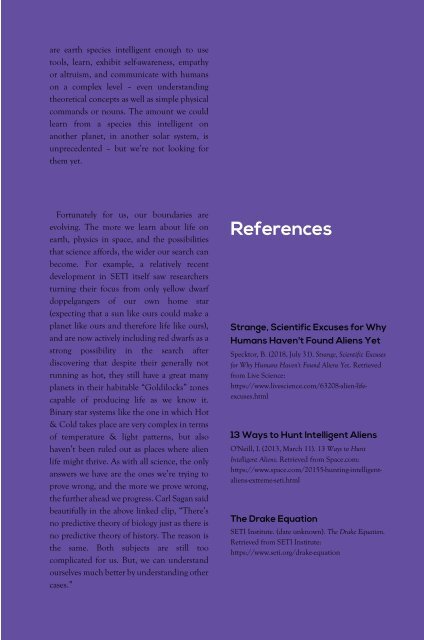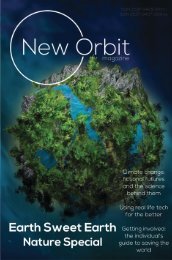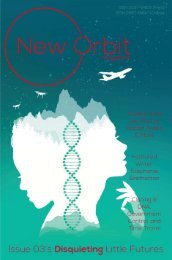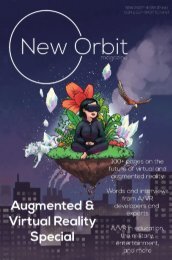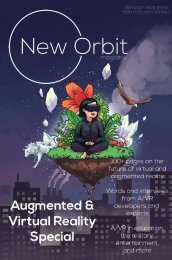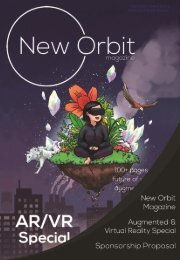New Orbit Magazine: Issue 04, October 2018
Create successful ePaper yourself
Turn your PDF publications into a flip-book with our unique Google optimized e-Paper software.
are earth species intelligent enough to use<br />
tools, learn, exhibit self-awareness, empathy<br />
or altruism, and communicate with humans<br />
on a complex level – even understanding<br />
theoretical concepts as well as simple physical<br />
commands or nouns. The amount we could<br />
learn from a species this intelligent on<br />
another planet, in another solar system, is<br />
unprecedented – but we’re not looking for<br />
them yet.<br />
Fortunately for us, our boundaries are<br />
evolving. The more we learn about life on<br />
earth, physics in space, and the possibilities<br />
that science affords, the wider our search can<br />
become. For example, a relatively recent<br />
development in SETI itself saw researchers<br />
turning their focus from only yellow dwarf<br />
doppelgangers of our own home star<br />
(expecting that a sun like ours could make a<br />
planet like ours and therefore life like ours),<br />
and are now actively including red dwarfs as a<br />
strong possibility in the search after<br />
discovering that despite their generally not<br />
running as hot, they still have a great many<br />
planets in their habitable “Goldilocks” zones<br />
capable of producing life as we know it.<br />
Binary star systems like the one in which Hot<br />
& Cold takes place are very complex in terms<br />
of temperature & light patterns, but also<br />
haven’t been ruled out as places where alien<br />
life might thrive. As with all science, the only<br />
answers we have are the ones we’re trying to<br />
prove wrong, and the more we prove wrong,<br />
the further ahead we progress. Carl Sagan said<br />
beautifully in the above linked clip, “There’s<br />
no predictive theory of biology just as there is<br />
no predictive theory of history. The reason is<br />
the same. Both subjects are still too<br />
complicated for us. But, we can understand<br />
ourselves much better by understanding other<br />
cases.”<br />
Specktor, B. (<strong>2018</strong>, July 31). Strange, Scientific Excuses<br />
for Why Humans Haven't Found Aliens Yet. Retrieved<br />
from Live Science:<br />
https://www.livescience.com/63208-alien-lifeexcuses.html<br />
O'Neill, I. (2013, March 11). 13 Ways to Hunt<br />
Intelligent Aliens. Retrieved from Space.com:<br />
https://www.space.com/20155-hunting-intelligentaliens-extreme-seti.html<br />
SETI Institute. (date unknown). The Drake Equation.<br />
Retrieved from SETI Institute:<br />
https://www.seti.org/drake-equation


